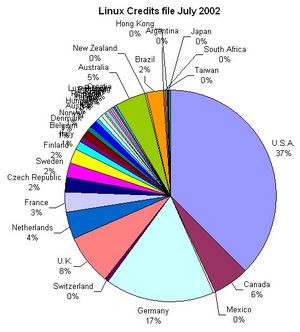Difference between revisions of "Linux Open Source Community (situation analysis)"
Rene spronk (talk | contribs) (new page) |
Rene spronk (talk | contribs) (add detail) |
||
| Line 1: | Line 1: | ||
| − | + | [http://www.linux.org/ Linux] is a free Unix-type operating system originally created by Linus Torvalds with the assistance of developers around the world. Developed under the GNU General Public License, the source code for Linux is freely available to everyone. | |
== Stakeholder Analysis == | == Stakeholder Analysis == | ||
| Line 9: | Line 9: | ||
== Business Models == | == Business Models == | ||
| + | |||
| + | There are at least four known business models for making money with open source software (see[http://www.opensource.org/advocacy/case_for_business.php 1] and [http://www.catb.org/~esr/writings/magic-cauldron/magic-cauldron-9.html 2]): | ||
| + | |||
| + | #'''Support Sellers''' (otherwise known as "Give Away the Recipe, Open A Restaurant"): In this model, you (effectively) give away the software product, but sell distribution, branding, and after-sale service. This is what (for example) Red Hat does. | ||
| + | #'''Loss Leader''': In this model, you give away open-source as a loss-leader and market positioner for closed software. This is what Netscape is doing. | ||
| + | #'''Widget Frosting''': In this model, a hardware company (for which software is a necessary adjunct but strictly a cost rather than profit center) goes open-source in order to get better drivers and interface tools cheaper. Silicon Graphics, for example, supports and ships Samba. | ||
| + | #'''Accessorizing''': Selling accessories – books, compatible hardware, complete systems with open-source software pre-installed. It's easy to trivialize this (open-source T-shirts, coffee mugs, Linux penguin dolls) but at least the books and hardware underly some clear successes: O'Reilly Associates, SSC, and VA Research are among them. | ||
| + | |||
| + | A business model spcific to Linux are [http://www.linux.org/dist/ "distributions"], a choice of packages bound around the Linux kernel. Today, creating and selling Linux distributions is a multi-million dollar business. You can buy a boxed version of Linux from companies such as Red Hat, SuSE, MandrakeSoft and others. You can also download Linux from any number of companies and individuals. | ||
Latest revision as of 11:11, 22 August 2005
Linux is a free Unix-type operating system originally created by Linus Torvalds with the assistance of developers around the world. Developed under the GNU General Public License, the source code for Linux is freely available to everyone.
Stakeholder Analysis
Figure 1 contains an analysis of the geographic stakeholder location of all developers listed in the Credits File. There are 412 developers listed in the file, which is representative of the "very active" developer community. Figure 2 show the geographic location of Linux users when registering their Linux installation. The process of registering is voluntary. With around 150000 registrations the geographic distribution is at least indicative.
Business Models
There are at least four known business models for making money with open source software (see1 and 2):
- Support Sellers (otherwise known as "Give Away the Recipe, Open A Restaurant"): In this model, you (effectively) give away the software product, but sell distribution, branding, and after-sale service. This is what (for example) Red Hat does.
- Loss Leader: In this model, you give away open-source as a loss-leader and market positioner for closed software. This is what Netscape is doing.
- Widget Frosting: In this model, a hardware company (for which software is a necessary adjunct but strictly a cost rather than profit center) goes open-source in order to get better drivers and interface tools cheaper. Silicon Graphics, for example, supports and ships Samba.
- Accessorizing: Selling accessories – books, compatible hardware, complete systems with open-source software pre-installed. It's easy to trivialize this (open-source T-shirts, coffee mugs, Linux penguin dolls) but at least the books and hardware underly some clear successes: O'Reilly Associates, SSC, and VA Research are among them.
A business model spcific to Linux are "distributions", a choice of packages bound around the Linux kernel. Today, creating and selling Linux distributions is a multi-million dollar business. You can buy a boxed version of Linux from companies such as Red Hat, SuSE, MandrakeSoft and others. You can also download Linux from any number of companies and individuals.

